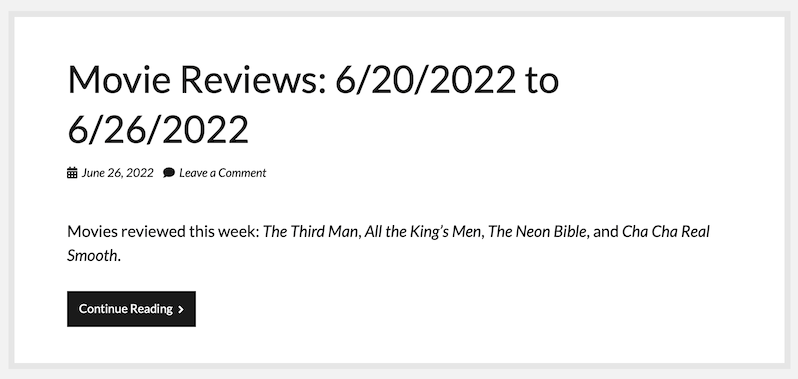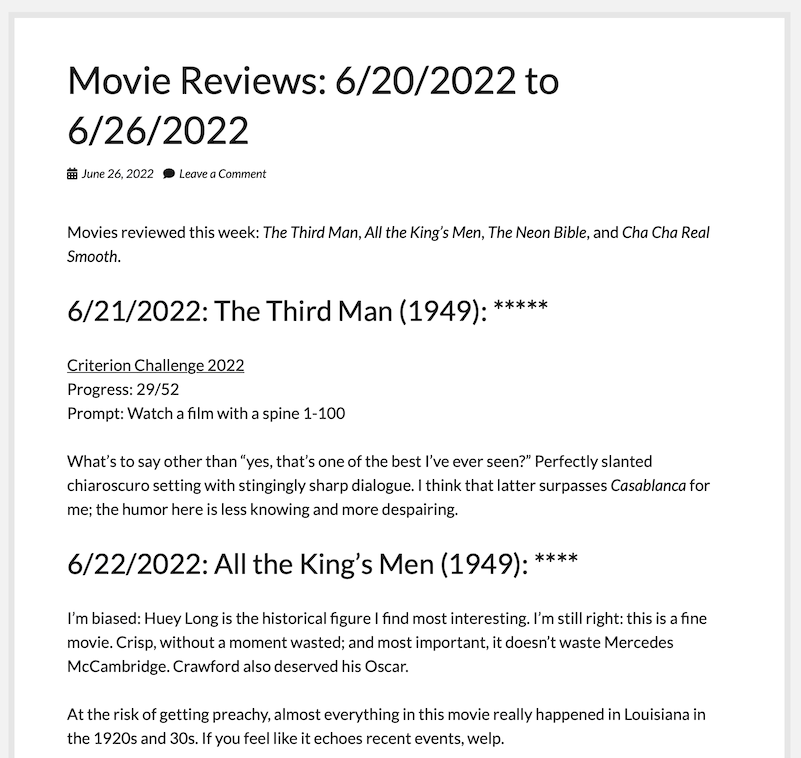This project was spawned by Elon Musk's Twitter bid, which reminded me that I want to control my own words as much as possible. While I don't expect to leave Letterboxd any time soon and I'm happy to pay for their services, I ultimately want to be able to display my words on my own server.
Then things got out of hand and now I have 770 lines of code.
Requirements:
- WordPress 6.0+
- BBSpoiler plugin
You could probably use another spoiler plugin, but might need to edit this script's code.
Head on over to your WordPress user panel. Click on your user name. Scroll down till you find the Application Password section and create a new one with a name something like "Letterboxd Feed". Make sure you copy the password when it's displayed; you won't be able to get at it again and it needs to go in your configuration file.
Disclaimer: this is not optimally secure; at the very least you may want to go to the trouble of creating a service account user, since you can't scope the application password to limit permissions. At the very most you might want to rewrite this script to use OAuth.
Requirements:
- python 3.7+
- sqlite
Download this repo however you like.
This script uses four python packages: requests, BeautifulSoup, feedparser, and xxhash. You can install these with:
python -m pip install -r ./requirements.txt
Copy lb_feed.conf.dist to lb_feed.conf. Make the following changes:
wp_key should be the application password you generated in the
WordPress installation section of this document.
wp_url should be the top level URL of your WordPress blog.
wp_user should be the user name associated with the application password.
post_categories and post_tags are the IDs for the WordPress category
and tag you want for your posts. You can use multiple IDs if you want
more than one category or tag. You can use show-tags-cats.py to find
the numeric IDs -- see the Usage section for more.
If you need multiple categories or tags, just provide a comma-separated list here. Example:
post_categories = 10,15
post_tags = 23,90,3
If you don't want either categories or tags, you can leave those lines commented out. Otherwise, remember to uncomment them.
lb_user should be your Letterboxd user name.
db_name should be the filename of your SQLite database. It defaults to
lb_feed.sqlite.
cite should probably be left alone. There are two options: italic or cite:
italic: wrap movie titles in <i> tags when making weekly postscite: wrap movie titles in the [cite] shortcode when making weekly posts
The [cite] shortcode only works if you've made a custom plugin for your WordPress
installation, which I've done but you probably haven't. This is kind of
more trouble than I expect anyone will want to go to, but if you want to
install my cite tag plugin, I stuck the code in
./wordpress/shortcite.php.
Set up your SQL database as follows:
sqlite3 lb_feed.sqlite < lb_feed.sql
If you don't want to keep the database in the same directory as the script, you can put it anywhere; just remember to adjust the configuration file.
Unless you're just getting started with Letterboxd or you don't care
about old reviews, you'll want to grab an export of your data so you can
import old reviews to the database. Go to the Account Data
page on your profile and hit
Export Your Data. You'll get a handy ZIP file containing, among other
things, a file called reviews.csv. Move that file somewhere handy.
Typically, the first time you run this you'll want something like:
./letterboxd-feed-wp.py fetchrss
./letterboxd-feed-wp.py fetchcsv --csv ./reviews.csv
./letterboxd-feed-wp.py writeweeks
And then on a weekly basis:
./letterboxd-feed-wp.py fetchrss
./letterboxd-feed-wp.py writeweeks
But there are lots of possibilities. Read on for details.
usage: letterboxd-feed-wp.py [-h] [-c CONFIG] [--csv CSV] [--dry-run]
[--start-date START_DATE] [--end-date END_DATE]
{fetchrss,fetchcsv,write,writeweeks,addspoilers}
positional arguments:
{fetchrss,fetchcsv,write,writeweeks,addspoilers}
Action for the script to take
optional arguments:
-h, --help show this help message and exit
-c CONFIG, --config CONFIG
Configuration files (defaults to lb_feed.conf)
--csv CSV Letterboxd export file to read from (defaults to
reviews.csv)
--dry-run Don't write to WordPress or SQLite DB
--start-date START_DATE
Start date for posts in YYYY-MM-DD format (defaults to
1970-01-01)
--end-date END_DATE End date for posts in YYYY-MM-DD format (defaults to
today)
You must specify one of five actions:
fetchrss: retrieves movie reviews from your Letterboxd RSS feed and
writes them to the database.
fetchcsv: retrieves movie reviews from a Letterboxd CSV export and
writes them to the database. By default, this option will look for a
file named reviews.csv, but you can specify another file with the
--csv option.
write: writes movie reviews to your WordPress blog as individual posts.
Don't bother using this option before you've fetched data.
writeweeks: writes movie reviews to your WordPress blog aggregated by
weeks. This script defines weeks as Monday through Sunday, with no
flexibility about that -- sorry! The weekly posts are nicely tucked
away behind a More block.
If you use writeweeks in conjunction with the -start-date or
--end-date option, the dates will be adjusted to end of week boundaries
instead of creating a partial week post.
cleandb: cleans the database of bad data. Currently this includes:
- remove stray poster images
You shouldn't need this if you're starting from scratch.
addspoilers: adds a spoiler column to a Letterboxd CSV export. By
default, this option will look for a file named reviews.csv, but you
can specify another file with the --csv option. It writes to stdout.
The need for this option was superseded by later code but I left it in here for historical interest and just in case.
There are also some options. We've discussed --csv.
--config: allows you to specify a different location for the configuration
file.
--dry-run: runs whatever action you've chosen without modifying either the
SQLite database or WordPress. Handy for testing.
--start-date and --end-date: allows you to specify processing reviews
posted between specific dates, inclusive (i.e., --end-date 2021-12-31
would process reviews posted on the last day of 2021). You can use one and
not the other. If you specify both and the end date is before the start
date, nothing will happen. Sorry, this is not your path to opening a
dimensional portal to a better world.
This is a quick little helper script I wrote to make it easier to find the numeric IDs for your WordPress categories and tags. It works as you might expect:
./show-tags-cats.py categories
213: 101 Tasks
65: Computer Games
37: Culture
etc.
There's no search functionality; just use grep on the output.
The tag list can take a while to display if you have a lot of tags. I have 455 tags and it took 13.5 seconds to run through them all.
usage: show-tags-cats.py [-h] [-c CONFIG] {categories,tags}
positional arguments:
{categories,tags} Specify values to retrieve
optional arguments:
-h, --help show this help message and exit
-c CONFIG, --config CONFIG


